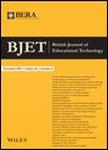版权所有:内蒙古大学图书馆 技术提供:维普资讯• 智图
内蒙古自治区呼和浩特市赛罕区大学西街235号 邮编: 010021

作者机构:Department of Creative Integrated Design I-Shou University Kaohsiung Taiwan Graduate Institute of Digital Learning and Education National Taiwan University of Science and Technology Taipei Taiwan Graduate Institute of Educational information and Measurement National Taichung University of Education Taipei Taiwan Yuan Ze University Taoyuan Taiwan Department of Science Education National Museum of Natural Science Taichung Taiwan Department of Operation Visitor Service Collection and Information Management National Museum of Natural Science Taichung Taiwan
出 版 物:《British Journal of Educational Technology》 (Br J Educ Technol)
年 卷 期:2024年第55卷第5期
页 面:2315-2338页
核心收录:
学科分类:0401[教育学-教育学] 04[教育学] 081203[工学-计算机应用技术] 0835[工学-软件工程] 0811[工学-控制科学与工程] 0812[工学-计算机科学与技术(可授工学、理学学位)]
主 题:Students
摘 要:Recently, alternate reality games (ARGs) have been applied in museum learning to encourage learners active engagement through playful problem-solving activities. However, most learners have insufficient prior knowledge and metacognitive skills to complete the learning tasks in such games. To support learning with ARGs, there is a need to provide proper feedback so that the learners are capable of self-regulated learning and solving the problems encountered during the learning process. Considering the influences of individual differences, this research developed a chatbot as a learning partner in ARG-based learning to support students’ learning with adaptive feedback in a museum. A quasi-experimental study was conducted to evaluate the effectiveness with and without the proposed approach. The results showed that the AI-based chatbot approach could significantly improve learners metacognition awareness, emotional engagement and behavioural engagement. Besides, it is helpful to facilitate students double-loop *** notesWhat is already known about this topic Alternate reality games (ARGs) enable students to interact with real-world contexts. The complexities of real contexts and ambiguities of the ARGs could frustrate students and demotivate their engagement in problem-solving activities. Conventional corrected feedback may fail to match individual students requirements in solving encountered problems. What this paper adds An AI-based chatbot was designed as a smart learning partner to support the students in solving encountered problems. The experimental results showed that the proposed approach improved students metacognitive awareness and engagement. A drawing analysis and a behaviour sequential analysis were applied to further examine the students perceptions and behavioural patterns. Implications for practice and/or policy It is potentially worth integrating AI-based chatbots into game-based learning to promote students metacognitive awarene